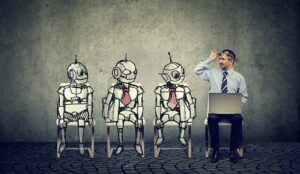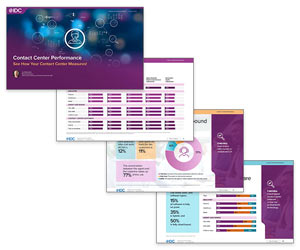Jafar Adibi of Talkdesk discusses what artificial intelligence (AI) really means, in regard to the contact centre.
According to Gartner, artificial intelligence (AI) has grown by 270% in enterprises over the past four years.
Despite this growth, there is still considerable confusion about what AI actually is, particularly in relation to machine learning, quantum computing, and even legacy automation technology.
AI washing — a ploy by vendors to attach themselves to AI when they do not have a viable AI solution — has become the rage, much like cloud washing was five years ago.
Gartner defines AI as applying advanced analysis and logic-based techniques, including machine learning, to interpret events, support and automate decisions, and take action.
AI is the technology that emulates human performance, typically by learning from it.
With so many companies claiming to have AI functionality, what must be included for a technology to really be AI?
What Really Qualifies a Product, Service or Solution as AI?
The definition of AI has evolved over the past decades. When AI and data science were still in their infancy in the 1950s, AI experts were looking to solve general problems.
Today, AI is more focused on specific problem-solving in specific domains, and there is still a very long way for AI to go in the future.
AI needs to move from pattern matching and finding the right solution from past experience to solving unseen difficult and challenging cases that need creativity.
However, with this evolution has come truths regarding what AI is — and is not — to data scientists:
The ability to make novel discoveries: An AI engine might identify a cluster in high-dimensional data that is not easy to see or discover.
Medical image processing and retail data processing are good examples of this, finding hidden clusters in high-dimensional data.
The ability to create generalizable rules for the future: If a system learns from the past with high accuracy but is not able to generalize to the future, it is not AI.
Trend detection is a good example of work that does not fit in an AI world.
While trend detection creates value for users, an AI system should be proficiently analysing millions of what-if scenarios to answer and react in the future.
The capability to transform data: AI systems should be able to transform data to be able to learn, analyse and infer.
For instance, a true AI system might transfer unstructured data (e.g. text, voice, etc.) to structured data ( e.g. categories, words, numbers, etc.).
The ability to learn and adapt: AI systems need to learn from past behaviours.
For example, we expect an intelligent word processing system to start learning our mistakes, typos, acronyms and the general sentence structure we use and our own personal style and our preferred words.
In addition, we expect a smart engine to start suggesting more sophisticated words if we are writing an article, while suggesting more technical words when we write a product overview document.
Additionally, we expect the same AI engine to identify who is using a laptop after the first 30 seconds of user activities.
The ability to make decisions in unfamiliar situations: Applying learning from the past to the future is only the first step for AI.
Intelligent systems should be able to infer from old data not only to predict an upcoming event but to attempt to come up with an answer for a new situation that has not been encountered in the past.
Imagine an autonomous car in California that has learned to drive in good weather and heavy traffic, that must now learn how to react on an early rainy morning when there is light traffic. Does it drive fast? Slow? What happens if a child crosses the road chasing a ball?
A true AI system is able to adjust to the unfamiliar and not only avoid the child but to expect a child to be behind the next rolling ball.
The ability to work with big data: In an age when data is king, AI is only as good as the data at its core. Bad data drives bad results.
As humans, we process millions of data points in a single day from an early age. AI should move toward processing unlimited amounts of data and be able to learn from every single piece of it.
The ability to remember and forget: One of the key factors of AI systems is the ability to forget knowledge that is not useful. Knowledge that does not have a purpose should be purged.
The entertainment industry learned over time that recommendation systems have to consider and learn that people’s interest will shift over time and that you cannot recommend a movie over and over for five years. Such a simple factor shows the value of time in every AI processing module.
The capability to interpret, describe and prescribe: As much as people are interested in AI magic, they are eager to explain the outcome. AI systems with the ability to interpret and explain can take human-computer interaction to the next level.
Imagine an AI system which can suggest everyone turn off their AC when they are not home to save energy.

Jafar Adibi
Based on available data, it learns that the AC should shut off at certain times of the day, turn on at others, shut off when it is a certain temperature outside, or blast cold air when the summer heatwave hits.
While the term AI has become more and more common for organizations promising to leverage the capability, real, purposeful AI remains a unique capability and differentiator beyond just enhanced marketing.
This blog post has been re-published by kind permission of Talkdesk – View the Original Article
For more information about Talkdesk - visit the Talkdesk Website
Call Centre Helper is not responsible for the content of these guest blog posts. The opinions expressed in this article are those of the author, and do not necessarily reflect those of Call Centre Helper.
Author: Talkdesk
Published On: 7th Feb 2020 - Last modified: 11th Feb 2020
Read more about - Guest Blogs, Talkdesk






 Talkdesk is a global customer experience leader for customer-obsessed companies. Our contact center solution provides a better way for businesses and customers to engage with one another.
Talkdesk is a global customer experience leader for customer-obsessed companies. Our contact center solution provides a better way for businesses and customers to engage with one another. 












